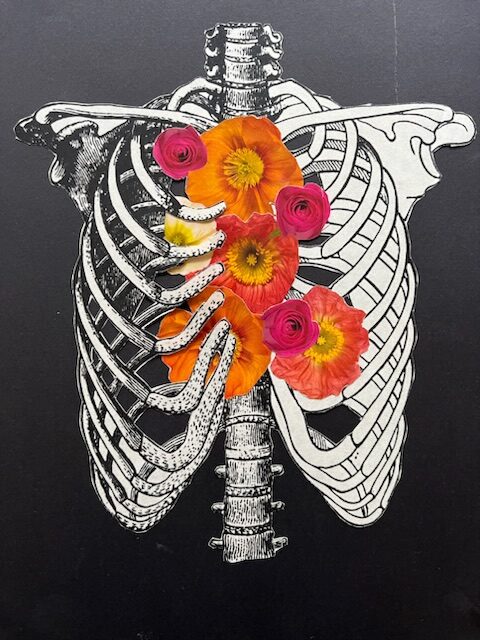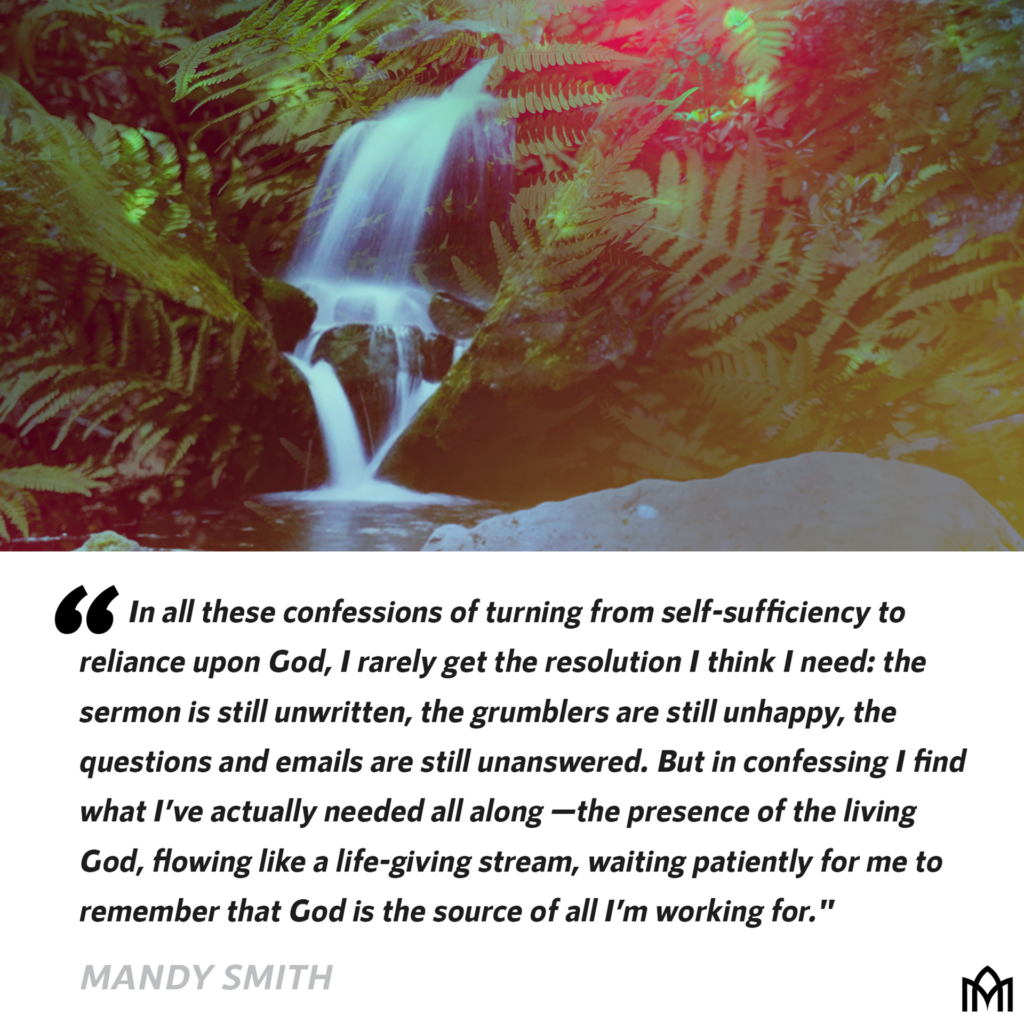Can Christian Leaders Hope to Flourish?
A Daily Practice that Helps Christian Leaders Come Alive
*Editorial Note: Confessions of An Amateur Saint: The Christian Leader’s Journey From Self-Sufficiency to Reliance on God, written by long-time friend and Leading Voice of Missio Alliance, Mandy Smith, releases wide on Tuesday, October 8th, 2024. Mandy’s pastoral wisdom, transparent leadership, and warm writing will draw you into your own transformational journey. We expectantly recommend Mandy’s book for purchase! ~CK
Every morning I wake with a weight that threatens to crush me.
In a post-Christian, post-pandemic world, everything in the culture and church are in upheaval. We feel it personally. Suddenly, with so much disruption at work in every level of our experience, we’re all pioneers, whether or not we like it.
How can we possibly have answers to all the theological questions, many of which weren’t even a part of the curriculum when we went to seminary? How can we know with certainty the best ministry models for a culture that is always in transition? How can we resolve political rifts or know the future of the church? And how can we ever overcome our own grief at the decline of the church and our own anxiety from the constant change necessary in order to lead with courage and clarity?
As Christian leaders, we feel the pressure daily. And we see the way it burns out our peers – so we work hard to rest well. But if we’re honest, even finding that balance can feel like a lot of work.
Is it too much to hope that we could not only survive, but flourish in this work?
What if there was a simple and ancient practice that transforms every anguish and anxiety into praise, so that even the challenges of this work equip and encourage us for it?
When I wake with the heaviness of the challenge of this work, I want to fix it, control it, and understand it. It sends me to my laptop, to research and to manage. But my efforts are never enough for the task, which then sends me to my bed, to hide under the covers, defeated once again.
///
In all these confessions of turning from self-sufficiency to reliance upon God, I rarely get the resolution I think I need: the sermon is still unwritten, the grumblers are still unhappy, and the emails are still unanswered. (1/2) Share on X
But in confessing I find what I’ve actually needed all along — the presence of the living God, flowing like a life-giving stream, waiting patiently for me to remember that God is the source of all I’m desperately working for. (2/2) Share on X
One day, in a desperate effort to find something better than my two coping habits of anxious activism and depressive passivity, I set out for a walk. After a solid 20 minutes of stomping and puffing, I could finally stand by the river and let out a cry to the Lord:
Here are all the ways I’m trying to fix, to control, to understand.
None of it is working. All of it is making me more anxious and defeated.
I confess, I’m trusting in myself. I confess I’ve disconnected from You.
And I confess again: I just need You!
I don’t feel it, but I want to believe that
You are actually the source of all the hope, energy, ideas I need.
I confess again my belief that Your Gospel is still Good News,
Your Spirit still heals hearts and transforms minds,
Your Word is still powerful,
and that the Gates of Hades will not prevail against Your Church.
There, by the river, I remembered Jeremiah 17:5-6, which describes a person who trusts in human strength instead of the Lord. They become like a bush in the wasteland, parched and lifeless. I know how that feels. And when I feel the drying up, far too often I simply work harder to bear the fruit that God has promised. But by working so hard to be a fruitful tree, I’m actually becoming more withered and barren.
By contrast, Jeremiah 17:7-8 describes the tree I actually want to be: never afraid in drought, consistently remaining green, always bearing fruit. This tree becomes so verdant by sending out its roots into a nearby stream.
This leads me to wonder the following: When we’re withered and dried up, do we suddenly think God has stopped being the giver of life? How could those signs of withering in us become a diagnostic? I ask this not to judge us, but to lead to transformation, a reminder that we’ve pulled our roots away from the stream of living water, and are consistently invited to reach out and root once again.
///
As Christian leaders, we’re shaped by a secular culture where professionalism means self-sufficiency. Far too often, we bring secular professionalism into our work as Christians. But professionalism as a Christian looks different: It means being unsurprised that we need something beyond ourselves, while simultaneously knowing how to rely on this need for God minute-by-minute.
This, for me, leads to two forms of daily confession:
-
- Confessing my secular habits of self-sufficiency, and
- Confessing my choice to rely on God again.
Although I’m in an incredibly challenging ministry context, confessing these prayers daily allows me to see uncanny flourishing (even healing!) in myself and in my congregation. Flourishing does not mean that it’s always easy or that I always feel good about my work – But it does mean that there is fruit and life that lasts. It means that, in spite of regularly feeling overwhelmed and exhausted, I still have hope and energy. And somehow, in spite of all that feels heavy, my face still lights up when I talk about God, as his work has taught me that I can’t do it without him.
As Christian leaders, we’re shaped by a secular culture where professionalism means self-sufficiency. Far too often, we bring this belief into our work as Christians. But professionalism as a Christian looks very different. (1/2) Share on X
Professionalism as a Christian leader means being unsurprised that we need something beyond ourselves, while simultaneously knowing how to rely on this need for God minute-by-minute. (2/2) Share on X

Among many things, Mandy Smith is an accomplished artist. Here is a recent confessional piece of hers that is simply gorgeous! ~CK
On a practical level, here’s how this practice of confession looks in my life as a pastor:
- When I’m anxious about my sermon, I have to confess, “Lord, I want to feel smart. I want to say something articulate and powerful. I confess that I’m trusting in my education and intelligence. I trust that You are the Spirit who shaped the Scriptures, and that You are the Spirit who inspires me. You are at work in my congregation.”
- When people don’t like my decisions, I have to confess, “Lord, I want people to like me. I confess that I’m relying on my people skills instead of Your leadership. I choose to trust that You are Lord of whatever happens here, even if it makes me deeply uncomfortable.”
- In pastoral conversations with people in pain, I have to confess, “Lord, I want to fix this person. How are You inviting me to partner with what Your Spirit is already doing in them?”
- When people ask me to defend my faith, I have to confess, “Lord, I want to be impressive and right. I confess I need Your guidance to know where to engage and where to step back. I need to know how to do both with grace.”
- When emails and to-do lists overwhelm me, I have to confess, “Lord I want to feel competent and efficient. I confess that I need Your help to have the time and energy to do what needs to be done, and to know what can remain undone.”
In all these confessions of turning from self-sufficiency to reliance upon God, I rarely get the resolution I think I need: the sermon is still unwritten, the grumblers are still unhappy, and the questions and emails are still unanswered. But in confessing I find what I’ve actually needed all along — the presence of the living God, flowing like a life-giving stream, waiting patiently for me to remember that God is the source of all I’m desperately working for.
And so, in a way that feels like pure grace, the very challenges of this work provide opportunities to internalize more deeply the goodness of God. Instead of being dried up by all that feels impossible, I have invitation after invitation to tap back into the One that I claim is my Hope.
Returning to this invitation from God gives me actual Good News to share – Good News of a God who never leaves us nor forsakes us, a God whose Spirit brings actual life and flourishing to Christian leaders and the communities they are shepherding.
///
Jeremiah 17:5-6 describes a person who trusts in human strength instead of the Lord. They become like a bush in the wasteland, parched and lifeless. I know how that feels. And when I feel the drying up, I often work harder. (1/2) Share on X
By contrast, Jeremiah 17:7-8 describes the tree I actually want to be: never afraid in drought, consistently remaining green, always bearing fruit. This tree becomes so verdant by sending out its roots into a nearby stream. (2/2) Share on X
*Editorial Note: After journalling over 40 daily confessions, Mandy began to wonder if seeing behind the scenes of this ordinary, raw confession process might be helpful to others. As she explains above, this lead to her latest book! ~CK





